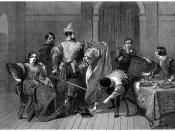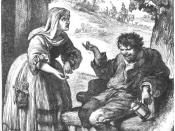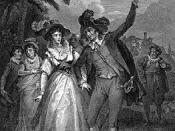Kate's soliloquy bring about a joyous conclusion to The Taming of the Shrew. The
audience leaves the theatre with a pleasant feeling, glad that such a shrew could be tamed
so well. Kate herself realised the error of her ways, making the men feel confident while
making the women feel safe. Moreover, the audience found the speech to be very sound
and sensible, as the views expressed in the play were extremely popular at that point in
time.
Kate, in realising her iniquitous ways, made the men feel extremely confident of
their status in Elizabethan society, and effectively reinforced their beliefs about their own
strength. Also, Shakespeare succeeds in creating a feeling of safety for the female
audience, as well as in making them feel as through they are accepted for their kindness
to men, and in the norm. Women, not having a strong role in society at that time,
enjoyed receiving praise and encouragement for their purpose in society.
Furthermore,
they felt vindicated as Kate solemnly insulted the disobedient women (Bianca and the
Widow), telling them to 'Come, come, you froward and unable worms!'. It may also be
said that this play, as well as similar plays of the Elizabethan era, assisted in contributing
to the oppression of females in society for an innumerable amount of years.
After the conclusion of The Taming of the Shrew, including Kate's soliloquy, the
audience is left with a proud feeling - proud of the fact that Petruchio tamed such a shrew
so well. The men of the audience are about with feeling of satisfaction and justification.
Shakespeare skillfully catered towards both sexes by using Petruchio much like the
stereotypical action figure of today; a character who does the unbelievable effortlessly
and leaves the audience in awe. In the play...



Kates soliloquy
its really well written but i feel that the purpose of the soliloquy is not to satisfy the men of the audience but to make everyone feel satisfied that kate is happy to be with petruchio and by giving in to her shrewness has realised that if she respects her husband he will respect her.The purpose of the two previous scenes is to show that the couple can now have fun with their private jokes,
1 out of 1 people found this comment useful.